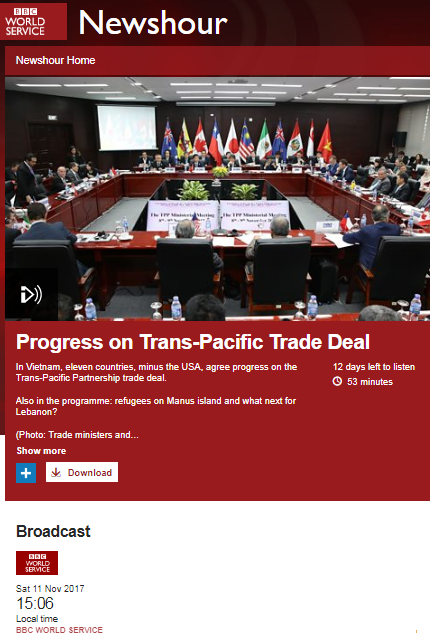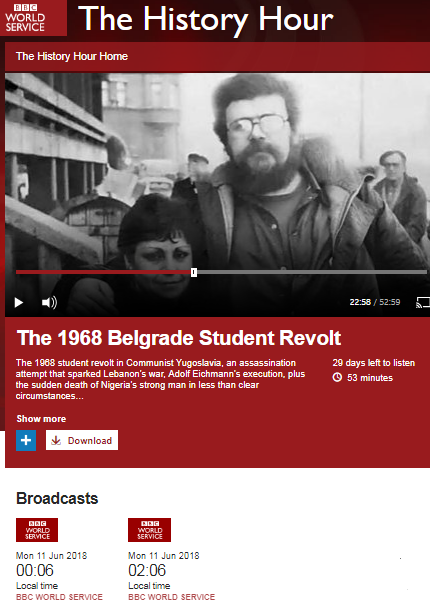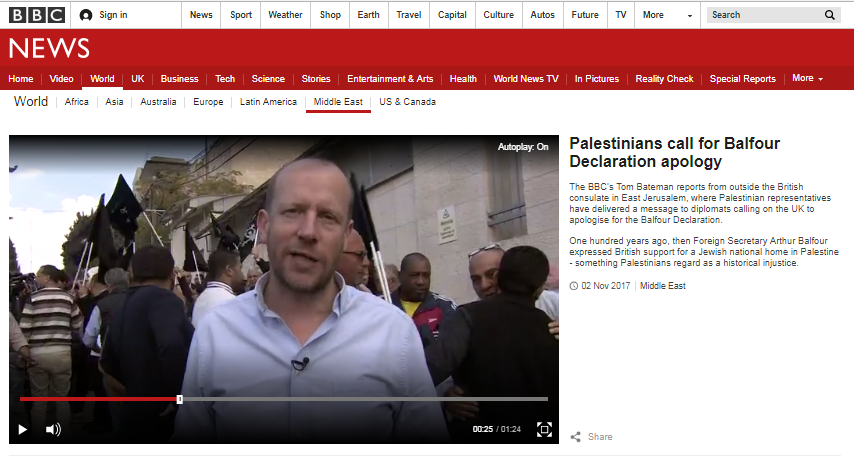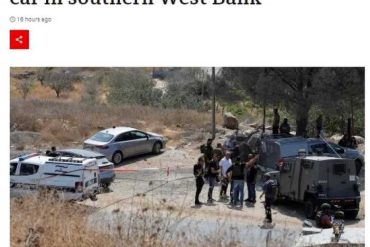The November 11th afternoon and evening editions of BBC World Service radio’s flagship news and current affairs programme ‘Newshour‘ both included an interview with a person presented only as a “political analyst and author” who on both occasions promoted Hizballah propaganda – including in relation to Israel.
The item in afternoon edition of the programme (from 30:00 here) – presented by Rebecca Kesby – opened with an introduction that made no mention of the relevant context of Hizballah’s designation as a terror organisation.
[emphasis in italics in the original, emphasis in bold added]
Kesby: “Now the shock resignation of Lebanese prime minister Saad Hariri a week ago has thrown the Middle East into diplomatic confusion. He made his announcement from Saudi Arabia. That fact alone has caused great unease in Lebanon with many suspecting that he was coerced into that decision. Yesterday the head of the powerful Lebanese Shia movement Hizballah Hassan Nasrallah said Mr Hariri’s resignation had been orchestrated by the Saudi government and its actions amounted to a declaration of war on Lebanon.”
Listeners then heard a voice-over translation of Nasrallah’s speech that had been aired in the previous evening’s edition of ‘Newshour’.
Nasrallah (v/o): “In short it is clear that Saudi Arabia and Saudi officials have declared war on Lebanon and on Hizballah in Lebanon. But I have to say, this is a war on Lebanon.”
Kesby: “So just how serious is this situation for Lebanon and the wider region? I’ve been speaking to Professor Amal Saad who is a Lebanese political analyst and author of ‘Hizbu’llah: Politics and Religion’.”
Listeners then heard uncritical repetition of the claim made by the head of the Lebanese terror organisation from the BBC’s chosen ‘analyst’.
Saad: “Well it’s definitely a serious one. Now when we talk about war, I’m not quite sure that military warfare is the only way this situation could escalate. I mean obviously that is an option but I don’t think it’s a very likely one at this moment. Just to kind of like centre Lebanon into this discussion, Lebanon is basically the new battleground where this regional escalation is…basically might take place, right? And Saudi Arabia has now basically declared war on Lebanon and in so doing, is also attempting to weaken Iran –of course focusing on Hizballah here in Lebanon. Now pundits are saying and a lot of people are very concerned that this could actually mean a Saudi-Israeli aggression on Lebanon. I think that’s quite unlikely at the moment. Obviously there isn’t going to be a Saudi-Iranian war so to speak. So what’s most likely to happen I think is a kind of security, possibly de-stabilisation of Lebanon. There might be an attempt to do that. And definitely some kind of economic war on Lebanon, which could actually harm Lebanon quite a bit – not just Hizballah. And the reason I say that is it’s very unlikely that the Israelis are going to allow themselves to do Saudi’s dirty work for them. First of all Saudi is definitely not going to launch any war on Lebanon on its own and definitely not one where it has to actually be at the forefront. It wants Israel to do most of this work.”
Kesby: “And why is that? Because it’s involved in actions elsewhere like Yemen?”
Saad then inaccurately told listeners that the coalition fighting in Yemen is “led by” the US, which – according to the BBC itself – is actually supplying “logistical and intelligence support”.
Saad: “Well that’s one reason of course and even in Yemen where it’s fighting an asymmetrical war against the much, much weaker Houthis, it’s still faring miserably. And it’s not only fighting there alone but fighting alongside an entire coalition – an international and Arab coalition – led by the US. So I really don’t see how the Saudis could expect to fare any better if they chose to confront Hizballah in Lebanon and of course Hizballah is far more sophisticated as a military power than the Houthis are. The Houthis have actually been accused, and so has Hizballah, of aiding the Houthis which means the Houthis are seen as a potential Hizballah model. But Hizballah is definitely here the template they fear the most so if they’re not doing very well fighting the Houthis, then it’s going to be much harder for them to fight Hizballah.”
Kesby: “OK, so let’s unravel why they see Hizballah as such a threat and whether that’s a growing threat in recent years. Obviously Hizballah has been around since the ’80s but there is this concern in the region certainly from the Saudis, isn’t there, that there’s this corridor – geographical as well as political and militarily – linking Hizballah in Lebanon, through Syria, to Iran. Why are they so threatened by Hizballah?”
Saad avoided answering that question, instead opting to amplify more Hizballah propaganda and present a context-free account of the second Lebanon war instigated by Hizballah that went completely unchallenged by Kesby.
Saad: “Well Hizballah has been perceived by Saudi Arabia as an enemy for many years now, especially over the past ten or twelve years. Yesterday, in fact, Nasrallah suggested that Saudi Arabia is not only now basically paying Israel money, pressuring it to invade Lebanon – now it actually did so in 2006 – and that’s because Hizballah is seen by Saudi Arabia as an impediment and a huge obstacle for its regional ambitions inside Lebanon.”
Saad then amplified another Hizballah talking point:
Saad: “It wants to dominate Lebanon and we’ve seen that very clearly over the past few days now with the arrest of the Lebanese prime minister Saad al Hariri. And it’s also being seen as a close ally of Iran and clearly Saudi Arabia sees Iran as its main rival in the region.”
Kesby: “Now we know that President Aoun hasn’t actually accepted Hariri’s resignation. We understand that he is planning to meet or meeting foreign ambassadors and other dignitaries today. I don’t know if you can tell us any more about that and what sort of support he might be seeking and how likely he is to get any support.”
Saad again parroted Hizballah messaging in her response – once again with no challenge at all from Kesby, despite the fact that the BBC had itself reported the previous day that “France’s foreign minister said France believed Mr Hariri was able to move freely”.
Saad: “Well he’s already asked European officials – in fact we saw the French yesterday as well. They issued a statement saying they too…it suggested that Hariri might be being held against his will. So I do think that Aoun’s activities borne some fruit so far because there is a concern among many European capitals and diplomats and I’ve been reading in Western media in fact that they do fear that Hariri is being held under some kind of house arrest and they are attempting to broker some kind of an agreement whereby he could be released. At the very least constitutionally he has not resigned until he comes back and submits a written resignation. This is one of the reasons why many people also believe he’s under house arrest as he’s not being allowed to do that. He’s not even making his resignation official. It was done in a very shoddy, lazy kind of manner on TV. He didn’t even come and submit an official resignation and at the very least, I think, what many of Lebanon’s diplomats in Lebanon would like to see is for at least this issue to be resolved because the government now is kind of suspended. It’s in a state of suspension. It’s not able to meet without their prime minister and yet it’s not a caretaker government either so it’s a very kind of fluid situation and one that isn’t at all conducive to Lebanon’s stability.”
Once more describing her sole interviewee as a “Lebanese political analyst”, Kesby closed the item there.
Parts of this interview were re-broadcast in the later edition of ‘Newshour’ on the same day, which will be discussed in part two of this post.
Related Articles:
Reviewing BBC portrayal of Hizballah in Hariri resignation reports




